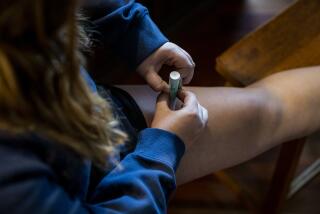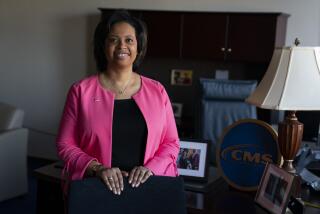Quick fixes feed obesity rate
The nation’s soaring obesity rates won’t fall until Americans stop placing their faith in unproven and possibly fraudulent weight-loss products and treatments. That’s the message from some of the nation’s top obesity experts, commenting on new data about Americans’ continued, naive hope for the quick fix.
Part of the problem, they say, is consumers’ misconceptions about safety laws. A national survey released last week at the annual meeting of the Obesity Society, a scientific group dedicated to the study of obesity, found that 60% of Americans believe incorrectly that over-the-counter dietary supplements for weight loss are required to have been tested and proven to be safe and effective. More than half mistakenly believed that these products are reviewed and approved by the Food and Drug Administration.
But the 1994 passage of the Dietary Supplement Health and Education Act amended laws so that dietary supplements are no longer subject to pre-market safety evaluations.
A group of obesity experts, who have formed a consortium called the Reality Council to promote a realistic approach to weight loss, released their comments in conjunction with the report and held a subsequent news conference as well.
They contend that the nation’s weight problem -- two-thirds of U.S. adults are overweight or obese -- is exacerbated by the scores of weight-loss products and treatments on the market that make unsubstantiated claims.
“These products raise false hopes and take a substantial amount of resources from the individuals who buy these products,” said M.R.C. Greenwood, an obesity researcher at UC Davis and a member of the consortium. “People buy these products rather than go into programs that do work.”
Greenwood spoke at a news conference Wednesday in the meeting’s wake.
The consortium says doctors, the media, businesses, consumers and lawmakers should support efforts by the Federal Trade Commission to halt misleading advertising linked to many weight-loss products.
In 2002, the FTC launched an initiative to identify false advertising claims on weight-loss products, such as those promoting two pounds or more a week of weight loss without cutting calories or those that say products can be worn or rubbed into the skin to reduce weight.
The program is a step up from what was available 10 years ago in terms of enforcement efforts, said Dr. George Blackburn, an associate professor of nutrition at Harvard Medical School. “It is having an effect.”
A list of weight-loss products identified by the FTC for making misleading claims can be found on its website at www.ftc.gov/bcp/conline/edcams/ojo/cases_health.htmweight.
The use of unproven products is a problem throughout the healthcare industry, Greenwood said. But, she said, misleading weight-loss products seem to generate less public scorn.
“If this was any other type of epidemic costing hundreds of billions of dollars, such as cancer or AIDS, and these types of products were being sold and consumed, the public would be outraged,” she said. “But victims of obesity blame themselves or are portrayed in such a way that the general public doesn’t have much sympathy for them.”
The survey on Americans’ knowledge of weight-loss products reinforces the picture of people looking for a quick and easy way to lose lots of weight and improve their appearance.
Fewer than one-third of those surveyed consulted a doctor in their attempt to lose weight -- a measure that could help them avoid unproven products and approaches. One-third used “potentially unproven” products.
Many Americans repeatedly try and fail at programs that also encourage unrealistic expectations, Blackburn said.
Those surveyed had made an average of 15 serious attempts to lose weight. Many expressed disappointment at not meeting their weight-loss goals but did not adjust their expectations to be more realistic in the future.
The survey randomly polled 3,500 Americans and was conducted by the University of Connecticut’s Center for Survey Research and Analysis, the University of Pennsylvania’s Center for Weight and Eating Disorders and GlaxoSmithKline Consumer Healthcare.
“Many of the people who take these products are the most vulnerable ones,” said Greenwood. “They are at high risk or are already overweight. They need to be in a program to help them understand that even modest weight loss will help them.”
More to Read
Sign up for Essential California
The most important California stories and recommendations in your inbox every morning.
You may occasionally receive promotional content from the Los Angeles Times.










